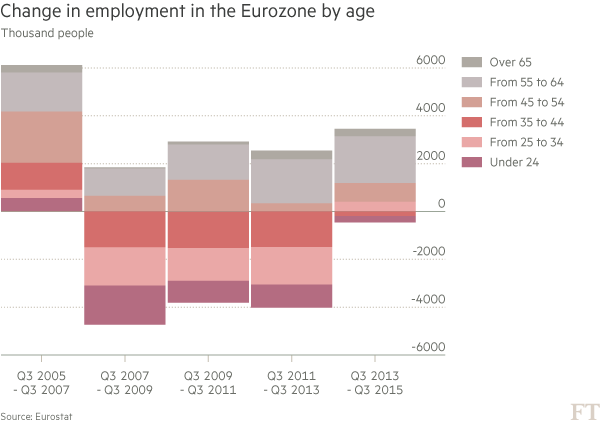Older workers lead employment growth in the Eurozone (lots of charts)
Employment is growing in the Eurozone. There were nearly 3 million more people in employment in the third quarter of 2015 than there were two years before.
However, of that 3 million around 2.3 million – or 75 per cent – were aged over 55, while the number of people in employment younger than 45 has continued to decrease.
The stronger employment performance of older workers is not new. Over the period of the crisis, jobs were lost among all age groups up to 45 years, but employment never stopped rising among the older population.
Italy lost about 1 million jobs – 5 per cent – from its employment peak in April 2008 to the trough in September 2013. Since then Italy has gained more than 400,000 jobs overall, but the number of people employed under the age of 55 has continued to decline.
In France employment expanded throughout the period analysed except for the two years to Q3 2009, but the growth was largely driven by older workers. In the two years to Q3 2015 employment for people aged under 45 expanded for the first time, but older workers still accounted for about two thirds of the net gain.
In Germany overall employment has been expanding since the start of 2010, but in contrast to France the number of people employed under the age of 45 never stopped falling. The 35 to 44 age group were hit particularly badly over the crisis and have yet to show any sign of recovery.
Spanish employment trends are different from those of the other major Eurozone countries. The employment contraction in Spain was massive. Nearly 3.8 million jobs – about 18 per cent of the workforce – were lost from August 2007 to February 2013. Younger workers were hit hardest, but there was also no growth in the employment of older workers. Since then employment has been expanding across nearly all age groups.
As with Spain, employment growth in the UK has not been concentrated among older workers. The employment performance of the group aged 45 to 55 showed an even stronger performance than the over 55 groups during and after the crisis. Those aged less than 35 were the ones hit more strongly by the crisis, but employment of these groups have grown faster since then. In the two years to Q3 2015 under-35s accounted for nearly half of all net employment growth.
But why have older workers led the employment recovery in the major Eurozone countries?
Structural reforms to pension and benefit system are an important part of the story. The trend could continue in France and Italy where, despite strong employment growth, fewer than 50 per cent of the population aged 55 to 64 were in the labour force in 2014, compared to 63 per cent in the UK.
Moreover, according to an ECB economic bulletin the strong employment trend among older people “may also reflect increased financial needs following losses in household wealth or income as a result of the financial crisis.”
Demographic effects – as the population ages – have had a larger effect in Germany where employment for the 35-44 age group contracted in terms of the number of jobs but remained fairly stable as a share of the population in that age group. However, both the absolute number of older workers and the proportion of the age group in employment have increased strongly since 2005.
But in France and more markedly in Italy the loss of jobs among younger employees and the lack of recovery have been even stronger trends than the changing demographic structure, and labour force participation rates have dropped among younger age groups over the last ten years.
High minimum wages and dual employment protection policies have beenmentioned as explanations for the lack of job opportunities for young people in both countries. In Italy, a poor vocational training system, high temporary contracts that lead to a lot of ‘churning’ and poor training of workers under fixed-term contracts all contribute to the poor employment performance among the youth.
The expansion of total employment in the Eurozone is good news, but the process now needs to involve young workers and those of prime working age.







No comments:
Post a Comment